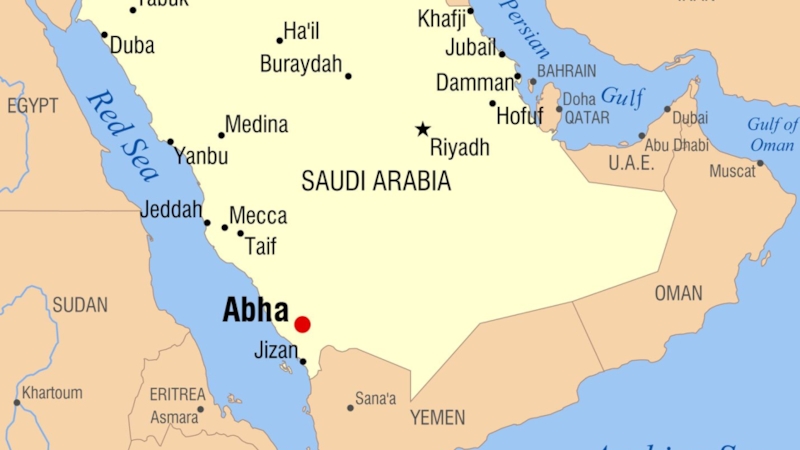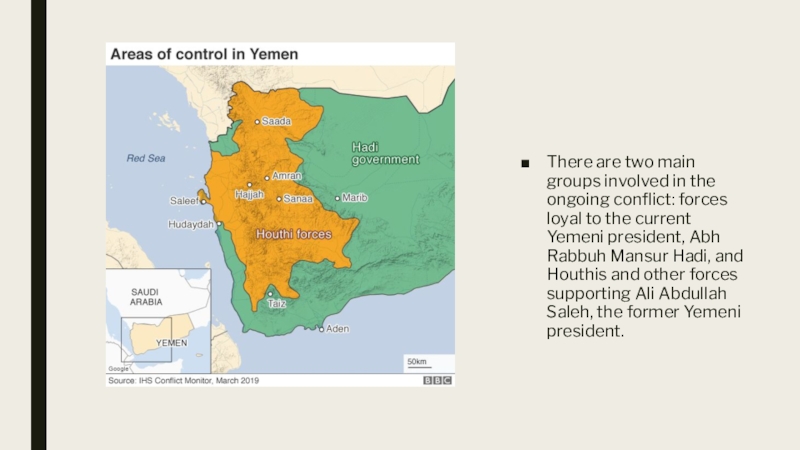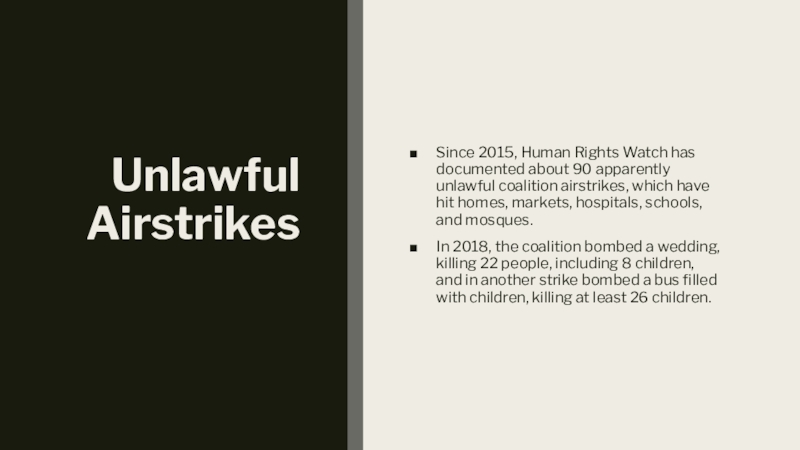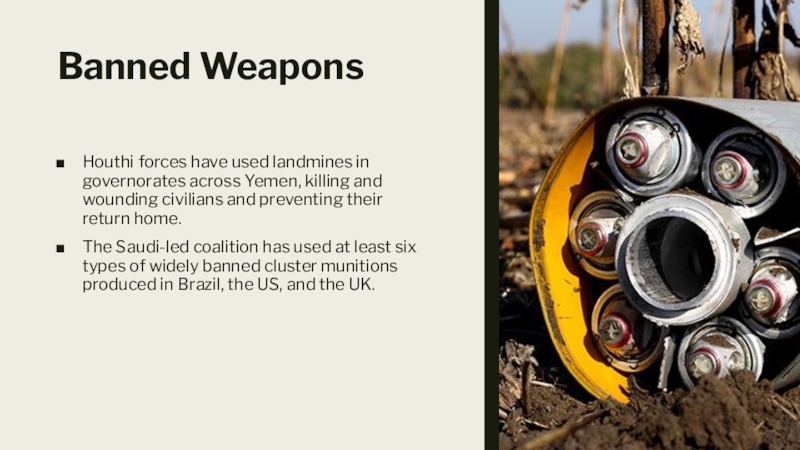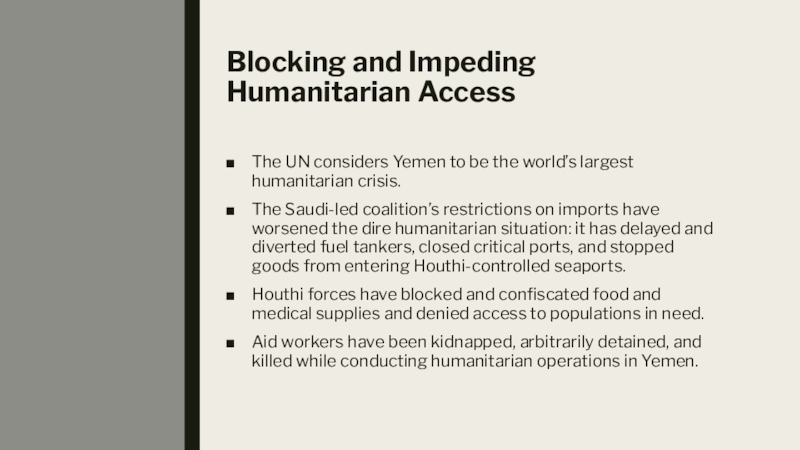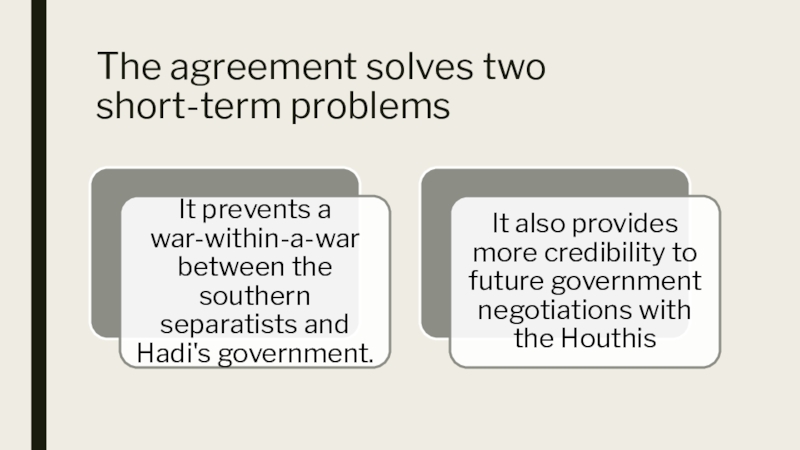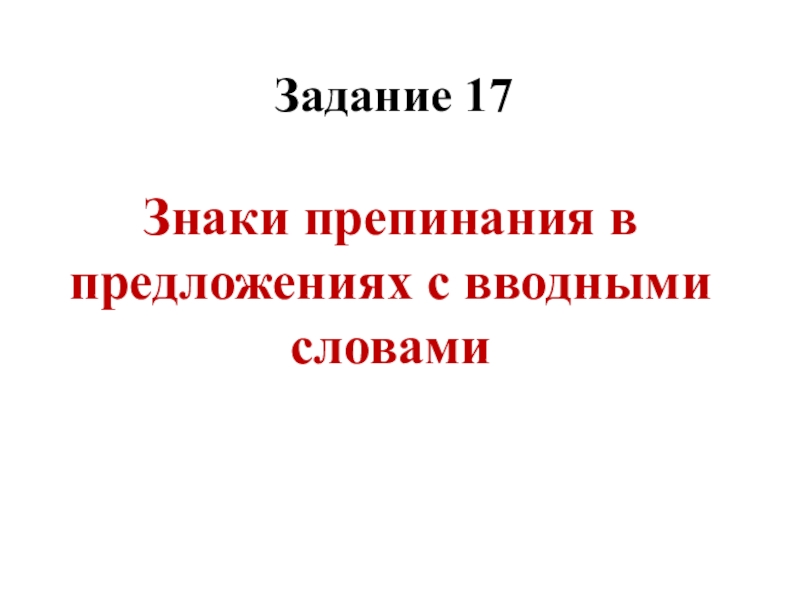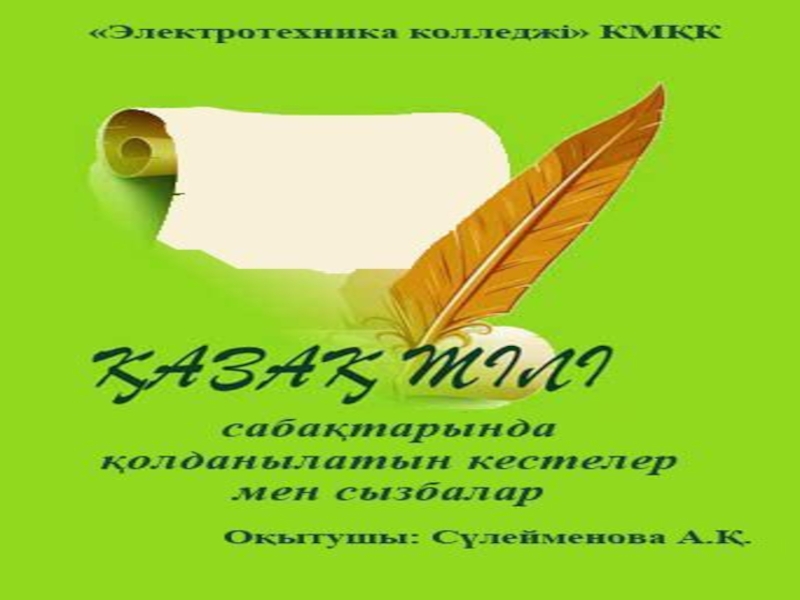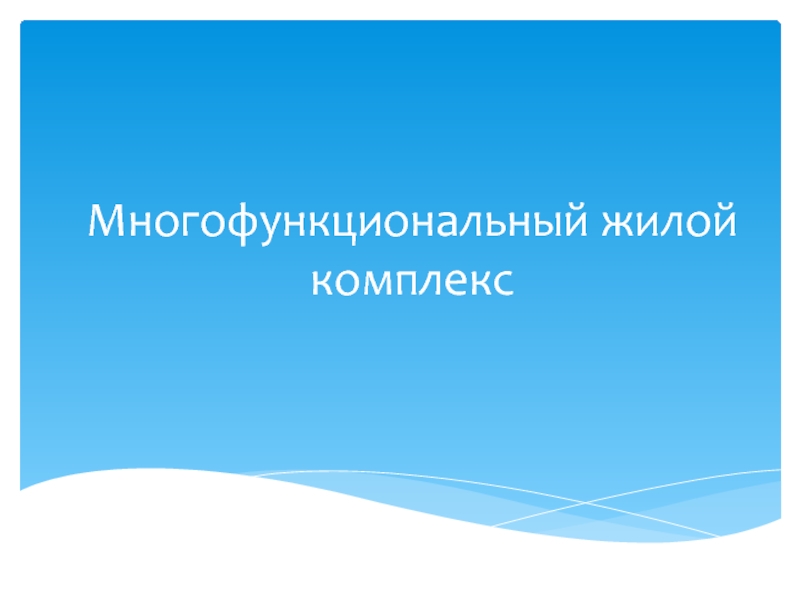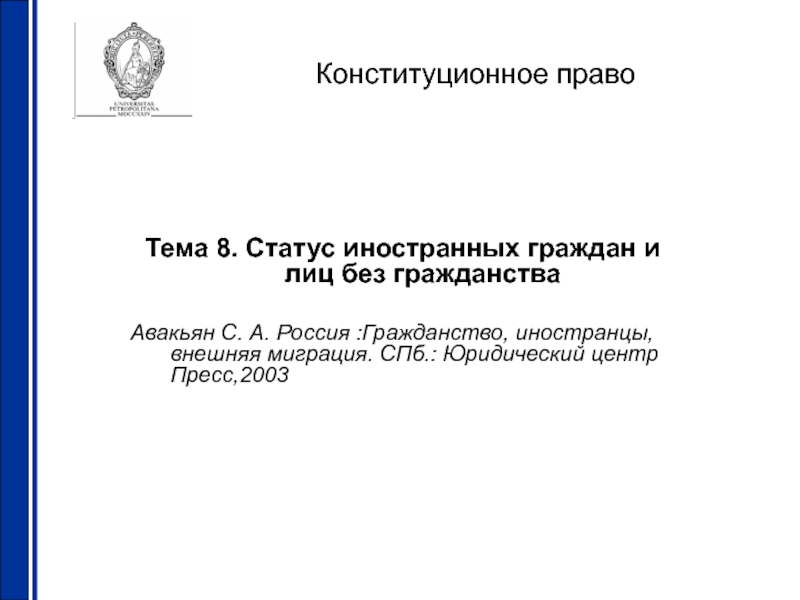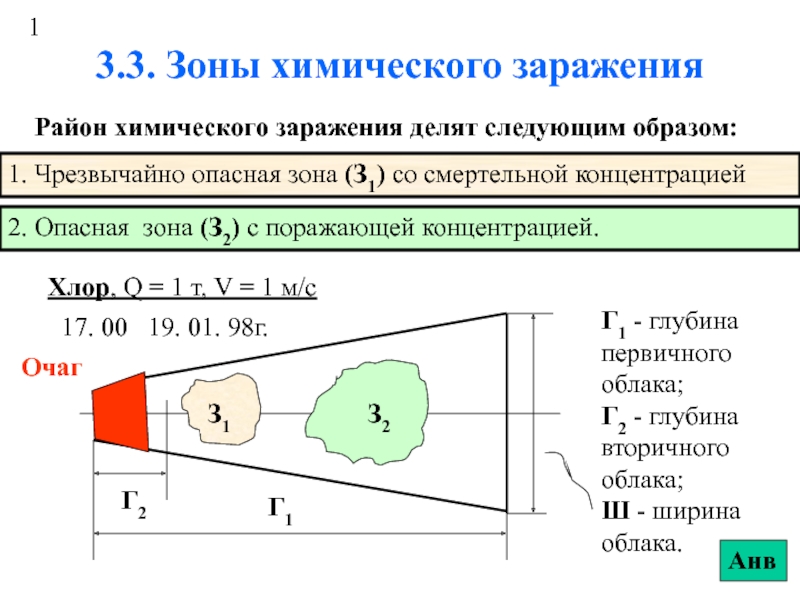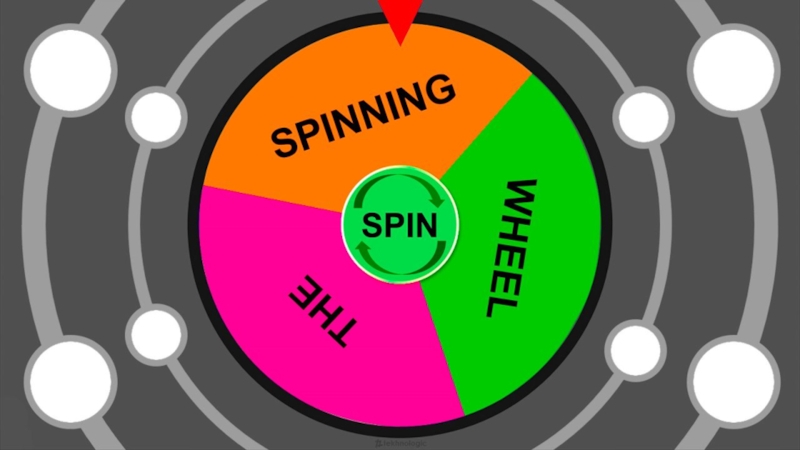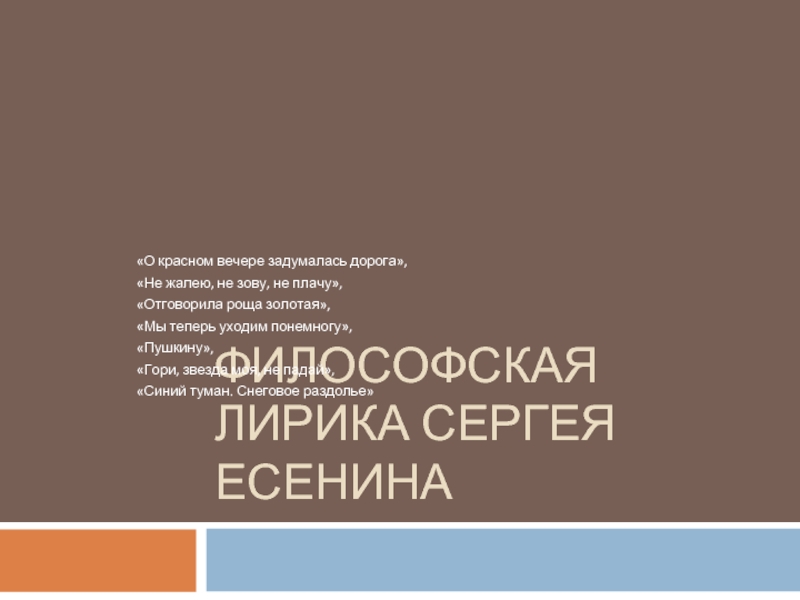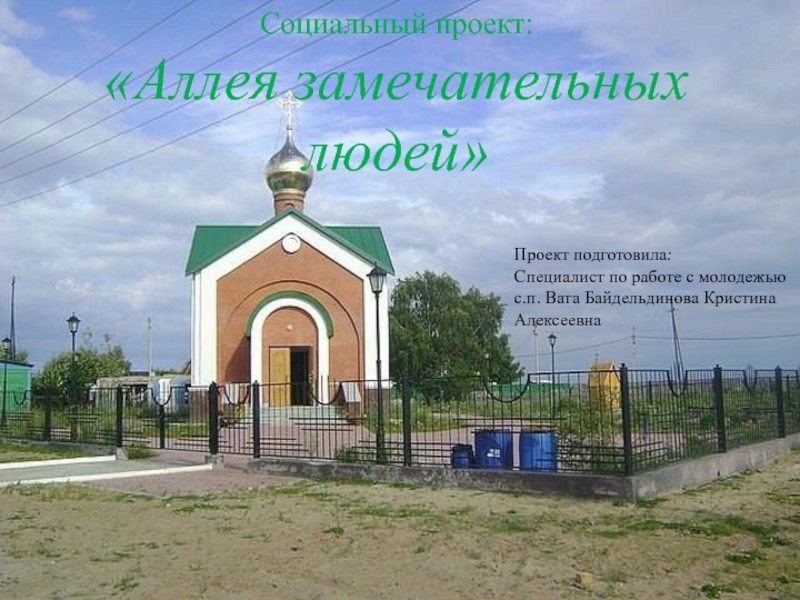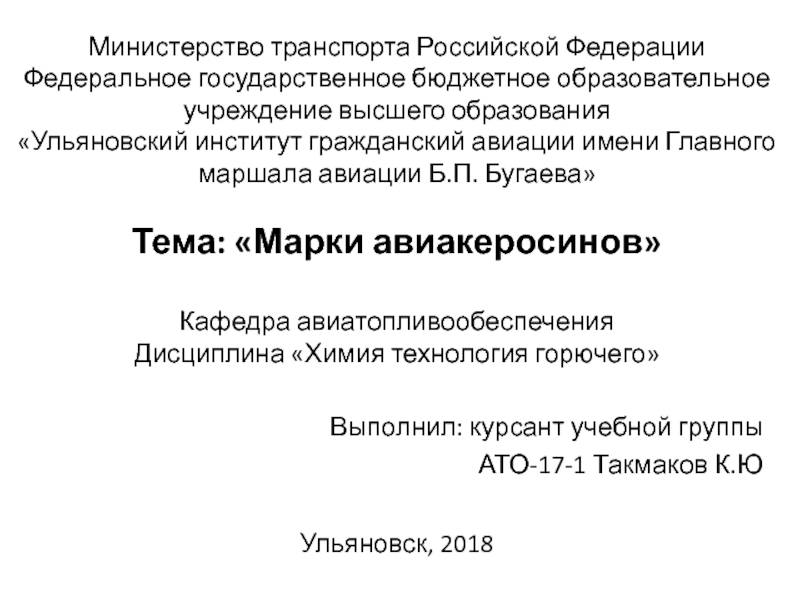Разделы презентаций
- Разное
- Английский язык
- Астрономия
- Алгебра
- Биология
- География
- Геометрия
- Детские презентации
- Информатика
- История
- Литература
- Математика
- Медицина
- Менеджмент
- Музыка
- МХК
- Немецкий язык
- ОБЖ
- Обществознание
- Окружающий мир
- Педагогика
- Русский язык
- Технология
- Физика
- Философия
- Химия
- Шаблоны, картинки для презентаций
- Экология
- Экономика
- Юриспруденция
Voilations of human rights during the Yemeni Civil War
Содержание
- 1. Voilations of human rights during the Yemeni Civil War
- 2. Слайд 2
- 3. Civil War in Yemen
- 4. There are two main groups involved in
- 5. Human rights violationsUnlawful AirstrikesIndiscriminate Artillery AttacksBanned WeaponsArbitrary
- 6. A man carries a wounded child after
- 7. Unlawful Airstrikes Since 2015, Human Rights Watch
- 8. Indiscriminate Artillery Attacks Houthi forces have repeatedly
- 9. Banned Weapons Houthi forces have used landmines in
- 10. Слайд 10
- 11. Arbitrary Detentions, Torture, and Enforced Disappearances Houthi
- 12. Attacks on Civil Society The Houthis have
- 13. Blocking and Impeding Humanitarian Access The UN
- 14. Children and Armed Conflict Houthi forces, government
- 15. Terrorism and Counterterrorism Both Al-Qaeda in the
- 16. Women’s and Girls’ Rights An estimated 3
- 17. The agreement between the Yemeni government and southern separatists
- 18. The agreement solves two short-term problems
- 19. Thank you for your attention!
- 20. Скачать презентанцию
Civil War in Yemen
Слайды и текст этой презентации
Слайд 4There are two main groups involved in the ongoing conflict:
forces loyal to the current Yemeni president, Abh Rabbuh Mansur
Hadi, and Houthis and other forces supporting Ali Abdullah Saleh, the former Yemeni president.Слайд 5Human rights violations
Unlawful Airstrikes
Indiscriminate Artillery Attacks
Banned Weapons
Arbitrary Detentions, Torture, and
Enforced Disappearances
Attacks on Civil Society
Blocking and Impeding Humanitarian Access
Children and
Armed ConflictTerrorism and Counterterrorism
Women’s and Girls’ Rights
Accountability
Слайд 6A man carries a wounded child after a Saudi-led airstrike
that killed eight members of her family in Sanaa, August
2017Слайд 7Unlawful Airstrikes
Since 2015, Human Rights Watch has documented about 90
apparently unlawful coalition airstrikes, which have hit homes, markets, hospitals,
schools, and mosques.In 2018, the coalition bombed a wedding, killing 22 people, including 8 children, and in another strike bombed a bus filled with children, killing at least 26 children.
Слайд 8Indiscriminate Artillery Attacks
Houthi forces have repeatedly fired artillery indiscriminately into
Yemeni cities and launched indiscriminate ballistic missiles into Saudi Arabia. Some
of these attacks may amount to war crimes. Houthi attacks have struck populated neighborhoods in Yemen, having a particularly devastating impact on Taizz, Yemen’s third largest city.Слайд 9Banned Weapons
Houthi forces have used landmines in governorates across Yemen, killing
and wounding civilians and preventing their return home.
The Saudi-led coalition
has used at least six types of widely banned cluster munitions produced in Brazil, the US, and the UK.Слайд 11Arbitrary Detentions, Torture, and Enforced Disappearances
Houthi forces, the Yemeni government,
and the UAE and UAE-backed Yemeni forces have arbitrarily detained
people, including children, abused detainees and held them in poor conditions, and forcibly disappeared people perceived to be political opponents or security threats.The Houthis have also taken hostages
In 2018, the UN Group of Eminent Experts on Yemen concluded that the Houthi, Yemeni, Saudi, and UAE forces were credibly implicated in detainee-related abuse
Слайд 12Attacks on Civil Society
The Houthis have detained students, human rights
defenders, journalists, perceived political opponents, and members of the Baha’i religious
community.The Saudi-led coalition and Yemeni government forces have also harassed, intimidated, and arrested activists and journalists.
Since May 2017, the coalition has restricted travel routes for journalists and international human rights organizations, including Human Rights Watch, to areas of Yemen under Houthi control, including via UN flights.
The coalition has kept Sanaa International Airport closed since August 2016.
Слайд 13Blocking and Impeding Humanitarian Access
The UN considers Yemen to be
the world’s largest humanitarian crisis.
The Saudi-led coalition’s restrictions on imports
have worsened the dire humanitarian situation: it has delayed and diverted fuel tankers, closed critical ports, and stopped goods from entering Houthi-controlled seaports. Houthi forces have blocked and confiscated food and medical supplies and denied access to populations in need.
Aid workers have been kidnapped, arbitrarily detained, and killed while conducting humanitarian operations in Yemen.
Слайд 14Children and Armed Conflict
Houthi forces, government and pro-government forces, and
other armed groups have used child soldiers. In 2017, the
UN varified 842 cases of recruitment and use of boys as young as 11, nearly two-thirds of which were attributable to Houthi forces.UN Secretary-General said in the annual report submitted to the Security Council that the coalition killed and wounded 729 Yemeni children in 2018.
The UN said it verified 1,689 child casualties in Yemen last year, including the killing of 576 and the maiming of 1,113.

